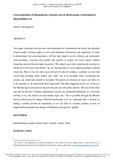- CERES Home
- →
- Cranfield Defence and Security
- →
- Staff publications (CDS)
- →
- View Item
JavaScript is disabled for your browser. Some features of this site may not work without it.
| dc.contributor.author | Van Engeland, Anicée | |
| dc.date.accessioned | 2019-11-20T11:08:55Z | |
| dc.date.available | 2019-11-20T11:08:55Z | |
| dc.date.issued | 2016-05-26 | |
| dc.identifier.citation | Van Engeland, A. Contextualisation of humanitarian assistance and its shortcomings in International Human Rights Law. Israel Law Review, Volume 49, Issue 2, July 2016, pp.169-195 | en_UK |
| dc.identifier.issn | 0021-2237 | |
| dc.identifier.uri | https://doi.org/10.1017/S0021223716000054 | |
| dc.identifier.uri | http://dspace.lib.cranfield.ac.uk/handle/1826/14751 | |
| dc.description.abstract | This article challenges the idea that contextualisation of humanitarian aid affects the principle of universality of human rights as well as the principles of neutrality and impartiality. It seeks to demonstrate that contextualisation will not only improve access, delivery and protection: contextualising a mission also enables aid workers to respect the local context without impacting negatively upon universal human rights. The author argues that affecting the societies in which aid is delivered is inevitable. The key then becomes to avoid endorsing indirect cultural relativism. This is why the article puts forward the idea of creating a yardstick or a test that would help in deciding which beliefs and values are to be included when considering the context, and which should be excluded. The process of selection of values and beliefs is to be operated by an empowered local population. The filter suggested in the case at hand is the Muslim legal instrument of maslaha, which protects the public interest. The use of this filter can be efficient only if Islamic authoritative sources are interpreted differently, in a reformist fashion, to try and match universal human rights law. This is possible through the Muslim theories advocating change. Muslim beneficiaries who are vulnerable as a result of a disaster or during a conflict provide an opportunity to test the filter of maslaha, looking at how an empowered community can change and influence the agendas of aid agencies. | en_UK |
| dc.language.iso | en | en_UK |
| dc.publisher | Cambridge University Press | en_UK |
| dc.rights | Attribution-NonCommercial 4.0 International | * |
| dc.rights.uri | http://creativecommons.org/licenses/by-nc/4.0/ | * |
| dc.subject | Humanitarian assistance | en_UK |
| dc.subject | Human rights | en_UK |
| dc.subject | Religion | en_UK |
| dc.subject | Islam | en_UK |
| dc.subject | Culture | en_UK |
| dc.title | Contextualisation of humanitarian assistance and its shortcomings in International Human Rights Law | en_UK |
| dc.type | Article | en_UK |
| dc.identifier.cris | 15830131 |
Files in this item
The following license files are associated with this item:
This item appears in the following Collection(s)
-
Staff publications (CDS) [1209]

